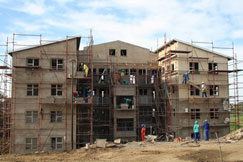Social development
SA govt passes 3-million housing mark
'Gap' housing
Sexwale said his department was, at the same time, working to develop "gap" housing, to address the aspirations of people such as nurses, fire fighters, teachers and members of the armed forces, who earned between R3 000 and R15 000 a month and therefore did not qualify for RDP (free) houses - but did not earn enough for bank bond approval, hence the "gap". Nationally, such people are being financially assisted by the National Housing Finance Corporation through an intervention called the Finance Linked Individual Subsidy Programme (FLISP), which gives all qualifying beneficiaries the certainty of being granted loans, bonds or mortgages by banks and other financial institutions.'Deracializing' space
On the challenges lying ahead, Sexwale said the most pressing was the need to "deracialize" space in the country, which continued to reflect the evil of apartheid social engineering. Undoing this legacy would require time and major resources, he said. As part of its strategy in this regard, the department was obliging banks to give loans to black people who wanted to buy properties in previously exclusively white areas. It had also been up buying high-rise buildings in inner cities, refurbishing and transforming them from office space to rented family units. This form of social housing had become popular with young couples, students and single mothers. Areas close to townships, known as "No-Man's Land", which had been used as buffer zones between black townships and white areas during apartheid, were also being eradicated, with the land going to housing needs, so moving people closer to cities. New non-racial towns and cities were also being developed to fulfill the principle of a united people in non-racial residential areas. Lephalale, which will be known as Joe Slovo City, in Limpopo province was an example of this policy, Sexwale said.Illegal sale of houses
On corruption, Sexwale said the commitment root it out remained undiminished, adding that the department was not in favour of "double-dipping", or the practice of moving into informal settlements from areas where services were being laid. In other cases, there were some housing recipients who sold their houses illegally. "This is fraudulent. We implore members of civil society to expose such chance-takers who, like many we have caused to be prosecuted, should face the full might of the law." Source: SAnews.gov.za
Tackling South Africa's housing shortage (Photo: Department of Human Settlements)
Related links
Related articles
- Cape Town's biggest housing project
- New houses for Elliot Dale residents
- SA service delivery 'no failure': SAIRR
- South Africa's living standards improve
- South Africa's plan for a better future
- Kanana Park housing project launched
- Govt, business in R300m housing project
- Praise for SA's human rights record
- SA in race to meet housing demand
- New social housing for East London
- Housing finance help on the way: Zuma




